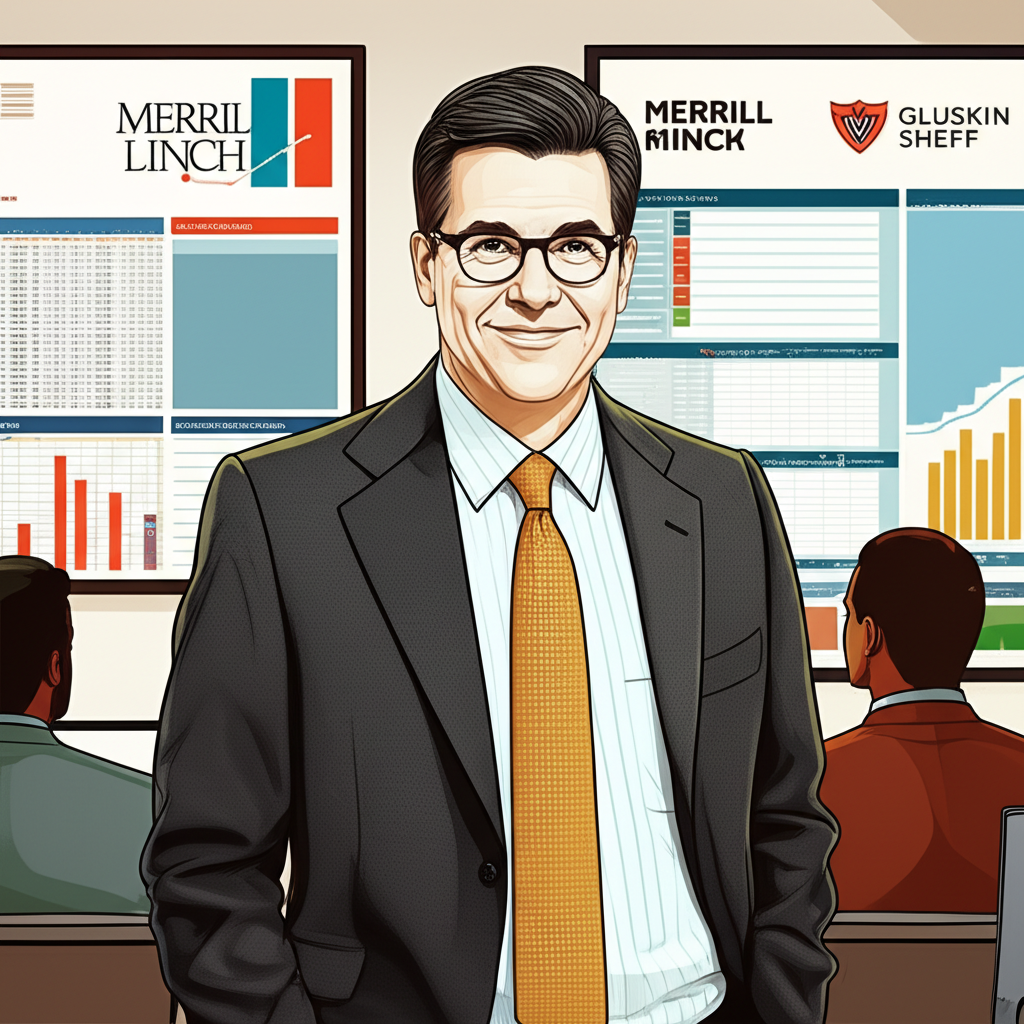Introduction: Who is David Rosenberg?

David Rosenberg has emerged as one of the most distinctive voices in modern economic commentary—a thinker unafraid to challenge prevailing market narratives with data-driven skepticism. As a respected Canadian economist and market strategist, his influence stretches across investment firms, financial media, and policy discussions worldwide. Known for his bearish yet methodical outlook, Rosenberg built a career on identifying structural risks before they became mainstream concerns. His analyses often focus on long-term trends such as debt accumulation, demographic shifts, and monetary policy distortions—factors he believes shape markets more profoundly than short-term sentiment. With decades of experience at top-tier financial institutions and now leading his own independent research firm, Rosenberg continues to offer a counter-narrative to conventional wisdom, earning both admiration and debate in equal measure.
Early Life and Academic Foundations

Rosenberg’s analytical rigor traces back to his formative academic years at the University of Toronto, where he earned a Master of Arts in Economics. Immersed in classical economic theory and empirical research methods, he developed a deep appreciation for historical patterns and statistical validation—tools that would later define his professional approach. Unlike many commentators who rely heavily on market momentum or sentiment, Rosenberg’s foundation in academic economics instilled a discipline centered on evidence, causality, and long-term cycles. This grounding allowed him to distinguish between temporary fluctuations and enduring structural shifts, a skill that would prove invaluable as global markets faced increasingly complex challenges. While little is publicly known about his personal life during this period, it’s clear that his time at university laid the intellectual groundwork for a career defined by clarity, precision, and independence.
The Formative Years: Merrill Lynch and Gluskin Sheff

Rosenberg’s ascent in the financial world began in earnest during his tenure at Merrill Lynch, where he served as Chief North American Economist. In this role, he was responsible for interpreting economic data from both the U.S. and Canada, translating complex indicators into actionable insights for institutional clients. His reports were known not only for their depth but also for their accessibility—distilling macroeconomic trends into clear, forward-looking narratives. Colleagues and investors alike came to value his ability to connect the dots between employment figures, interest rate movements, housing data, and equity performance.
After nearly a decade at Merrill Lynch, Rosenberg transitioned to Gluskin Sheff + Associates Inc., a leading Canadian wealth management firm, where he took on the dual role of Chief Economist & Strategist. Here, his responsibilities expanded beyond economic forecasting to include asset allocation and portfolio strategy. Working closely with high-net-worth families and institutional investors, he helped shape investment decisions based on macroeconomic convictions rather than market noise. This period further honed his reputation as a strategist who could bridge the gap between economic theory and real-world portfolio implications.
Navigating the 2008 Financial Crisis

It was in the years leading up to the 2008 financial crisis that David Rosenberg’s analytical foresight truly came into focus. While many economists and market participants remained optimistic about housing and credit markets, Rosenberg consistently warned of mounting imbalances. He pointed to unsustainable levels of consumer debt, the proliferation of subprime lending, and the fragility of financial institutions overly reliant on leveraged instruments. His early and repeated calls for caution stood in stark contrast to the prevailing confidence on Wall Street and Bay Street.
As home prices peaked and defaults began to rise, Rosenberg’s warnings gained credibility. When the crisis erupted, his analysis provided investors with a framework for understanding not just what was happening, but why. He emphasized the systemic nature of the collapse—rooted in excessive leverage, flawed risk models, and policy missteps—rather than attributing it to isolated factors. This period cemented his status as a contrarian voice with real predictive power, someone willing to stand apart from consensus when data demanded it.
Founding Rosenberg Research: A New Chapter
In 2019, David Rosenberg took a bold step toward full independence by launching Rosenberg Research & Associates Inc., a move that reflected his desire to operate outside the constraints of traditional financial institutions. Free from corporate mandates or client pressures, the firm was designed to deliver unfiltered, long-term macroeconomic analysis to a global audience. Its client base includes institutional investors, hedge funds, family offices, and financial advisors seeking a deeper understanding of market dynamics beyond quarterly earnings or Fed commentary.
Rosenberg Research quickly established itself as a trusted source of insight in an era of information overload. The firm’s daily publications, deep-dive reports, and strategic outlooks are grounded in a philosophy of intellectual honesty and methodological consistency. Rather than chasing headlines or reacting to daily market swings, Rosenberg and his team prioritize structural forces—what they call the “big picture” drivers of economic outcomes.
The Philosophy Behind Rosenberg Research
At the heart of Rosenberg Research lies a commitment to top-down, data-first analysis. The process typically begins with an exhaustive review of economic fundamentals—labor market trends, inflation metrics, balance sheet health, and monetary aggregates—before considering market implications. This approach stands in contrast to sentiment-driven or technical strategies that dominate much of today’s financial commentary.
A defining feature of the firm’s methodology is its skepticism toward consensus views. Rosenberg frequently challenges assumptions embedded in mainstream forecasts, especially when they rely on extrapolating recent trends without regard for historical precedent. For example, during periods of elevated inflation expectations, he has often argued that underlying structural forces—such as aging populations, high debt burdens, and technological efficiency—exert persistent deflationary pressure, even amid temporary price spikes.
Historical context also plays a central role. Rosenberg frequently draws comparisons to past economic cycles, including the Great Depression, the 1970s stagflation, and Japan’s lost decades, to illustrate how similar patterns can reappear under different guises. This long-view perspective allows clients to anticipate turning points before they become obvious to the broader market.
David Rosenberg’s Signature Economic Views and Predictions
Throughout his career, Rosenberg has maintained a consistent set of core beliefs that shape his economic outlook. Among the most prominent is his advocacy of the secular stagnation thesis—the idea that advanced economies may face prolonged periods of low growth, weak demand, and insufficient investment. This concept, originally proposed by Alvin Hansen and revived by economists like Larry Summers, aligns with Rosenberg’s observations of declining productivity, rising inequality, and stagnant wages despite decades of monetary stimulus.
He has also been a persistent voice highlighting the dangers of excessive debt, particularly when coupled with aging demographics. In his view, both government and household balance sheets in developed nations have reached thresholds where further borrowing yields diminishing returns, if not outright risks. This stance has led him to question the sustainability of ultra-low interest rates and large-scale quantitative easing programs, especially when used as permanent tools rather than emergency measures.
Another recurring theme in his work is housing market vulnerability. Drawing on detailed data analysis, Rosenberg has frequently cautioned against overvaluation in residential real estate, particularly in markets like Canada and certain U.S. coastal cities. He argues that rising prices disconnected from income growth and affordability metrics create inherent instability—a warning that resonates strongly in today’s high-rate environment.
Notable Forecasts and Their Outcomes
Rosenberg’s track record includes several high-impact predictions that have reinforced his reputation for foresight. His early warnings about the 2008 crisis remain the most notable, but his influence extends well beyond that single event. In the aftermath of the pandemic, when inflation surged due to supply chain bottlenecks and fiscal stimulus, many forecasters predicted a new era of persistent price increases. Rosenberg, however, argued that these pressures were largely transitory and that deeper structural forces would eventually reassert deflationary trends.
While inflation proved more persistent than anticipated in 2021–2022, Rosenberg’s broader point—that central banks would need to hike aggressively and that demand destruction would follow—was borne out. As growth slowed and labor markets softened in 2023, inflation began to moderate, validating aspects of his structural argument. Similarly, his long-standing concerns about equity valuations—particularly during the tech-driven bull markets of the 2010s and early 2020s—have positioned him as a cautious voice amid periods of euphoria.
It should be noted, however, that being right in the long run does not always mean being right on timing. Some critics have observed that Rosenberg’s bearish calls have occasionally preceded market corrections by years, testing the patience of followers. Yet, for those focused on risk management and capital preservation, his early warnings serve as valuable guardrails against complacency.
Contrarianism and Market Impact
Labeling David Rosenberg a contrarian is accurate—but incomplete. His divergence from consensus is not performative; it emerges organically from his analytical process. When markets celebrate strong job numbers as unambiguously positive, he might highlight rising labor force participation as a sign of hidden slack. When inflation spikes, others may call for tighter policy, while he examines whether demand destruction is already underway.
This mindset encourages investors to question assumptions and consider alternative scenarios. In an industry where groupthink can lead to herd behavior and costly mistakes, Rosenberg’s presence introduces cognitive diversity. His influence is evident in how fund managers, analysts, and advisors incorporate stress-testing into their models—asking, “What if the recovery isn’t as robust as everyone thinks?” or “Could deflation return despite current inflation?”
His impact isn’t measured solely by accuracy, but by the quality of debate he sparks. By consistently offering a well-reasoned, evidence-based alternative, he elevates the standard of discourse in financial markets.
Media Presence, Publications, and Public Engagement
David Rosenberg remains a prominent figure in financial media, regularly contributing to major networks such as CNBC, Bloomberg TV, and BNN Bloomberg. His appearances are marked by clarity and conviction, often cutting through jargon to deliver insights that resonate with both professionals and informed investors. Unlike some commentators who tailor messages for soundbites, Rosenberg uses interview opportunities to educate—explaining not just what he expects, but how he arrived there.
Beyond television, his daily newsletter, “Breakfast with Dave,” has become a staple for many in the finance industry. Delivered each morning, it combines a recap of key market moves, a breakdown of recent economic data, and Rosenberg’s latest thinking—all presented in a concise, readable format. Subscribers include portfolio managers, strategists, and advisors who rely on it to start their day with context and perspective.
He also contributes thought leadership pieces to financial journals, speaks at industry conferences, and participates in private briefings for institutional clients. Through these channels, he continues to shape how macroeconomic issues are understood and acted upon across the investment community. Bloomberg’s profile on David Rosenberg highlights his extensive media presence and enduring relevance in economic commentary.
The Evolution of an Economist: Adapting to Changing Landscapes
Though often associated with caution, Rosenberg’s analytical framework is not static. Over decades, he has demonstrated a willingness to refine his views in response to new data and evolving conditions. While his core concerns—debt, demographics, and structural weakness—remain central, his application of these themes evolves.
For instance, while historically skeptical of equities during late-cycle expansions, he has identified pockets of opportunity in sectors benefiting from automation, energy transition, or demographic shifts. He has also adapted his inflation outlook to account for geopolitical disruptions, deglobalization trends, and shifts in labor supply post-pandemic—factors that introduce volatility into otherwise deflationary frameworks.
His response to monetary policy experimentation, particularly the expansion of central bank balance sheets and negative interest rates, reflects this adaptability. Rather than dismissing these tools outright, he assesses their diminishing returns and unintended consequences—such as asset inflation, wealth inequality, and financial instability—within a broader analytical context.
This intellectual flexibility ensures that his insights remain relevant even as the global economy undergoes transformative changes.
David Rosenberg’s Enduring Influence and Legacy
David Rosenberg’s legacy extends beyond individual forecasts. He has helped cultivate a generation of analysts and investors who prioritize fundamentals over narratives, data over dogma. In an age of instant opinions and algorithmic trading, his work serves as a reminder that deep economic understanding requires patience, humility, and intellectual courage.
He has influenced how market participants interpret debt cycles, evaluate housing markets, and anticipate policy turning points. More importantly, he has modeled a way of thinking—one that questions consensus, respects history, and acknowledges uncertainty. His legacy is not just in being right about specific events, but in shaping a more rigorous, reflective approach to investing and economic analysis.
By maintaining independence and adhering to a disciplined methodology, Rosenberg has become a benchmark for integrity in financial commentary—a voice that challenges, informs, and ultimately strengthens the markets he analyzes.
Critiques and Perspectives on His Work
Despite widespread respect, Rosenberg’s outlook has attracted criticism, particularly from those who view his persistent emphasis on risk and restraint as overly pessimistic. The label “permabear” follows him, suggesting a bias toward negative outcomes regardless of cyclical improvements. Critics argue that his focus on structural headwinds may underplay the resilience of innovation, consumer spending, or policy effectiveness in driving recoveries.
Others point out that his deflationary stance has faced challenges in periods of supply-driven inflation, such as during the energy shocks of the 1970s or the post-pandemic surge in prices. While he correctly anticipated the disinflationary impact of technology and demographics, exogenous shocks can disrupt even the most robust frameworks.
Still, supporters contend that his role is not to predict every twist in the business cycle, but to provide a necessary counterbalance to excessive optimism. In environments where risk-taking is rewarded until it isn’t, having a voice that emphasizes prudence and preparation adds value. As the Financial Post article notes, his decision to leave the institutional finance world underscores a commitment to independence—one that naturally invites both acclaim and scrutiny.
Conclusion: A Continual Voice in Economic Dialogue
David Rosenberg stands as a defining figure in modern economic thought—not because he always predicts the future perfectly, but because he insists on asking the right questions. From his early days analyzing North American trends at Merrill Lynch to guiding independent research through Rosenberg Research, his career reflects a steadfast dedication to data, logic, and intellectual honesty.
His contrarian insights, particularly around the 2008 crisis and structural market risks, have earned him a place among the most influential economists of his generation. Through daily commentary, strategic research, and public engagement, he continues to challenge assumptions, provoke debate, and offer clarity in uncertain times.
As global markets navigate rising debt, shifting demographics, and policy uncertainty, voices like Rosenberg’s—grounded in history, focused on fundamentals, and unafraid to dissent—remain essential. For investors, policymakers, and analysts alike, he offers not just predictions, but a framework for thinking critically about the forces shaping our financial future.
What is David Rosenberg’s background and education?
David Rosenberg holds a Master of Arts degree in Economics from the University of Toronto. His educational background provided him with a strong foundation in economic theory and statistical analysis, which he has applied throughout his distinguished career in finance.
What are the core services offered by Rosenberg Research?
Rosenberg Research & Associates Inc. provides independent, data-driven macroeconomic analysis and market strategy. Their core services include daily economic commentaries (such as “Breakfast with Dave”), in-depth research reports, and strategic market outlooks for institutional investors, hedge funds, and high-net-worth individuals.
How did David Rosenberg’s views on the 2008 financial crisis differ from mainstream economists?
David Rosenberg was among the earliest and most vocal economists to warn about the impending housing market collapse and the systemic risks of the subprime mortgage crisis well before many mainstream economists acknowledged the severity of the situation. His prescient warnings contributed significantly to his reputation as a contrarian and astute observer.
What are David Rosenberg’s current predictions for the global economy?
While specific predictions vary with market conditions, David Rosenberg often maintains a cautious outlook, frequently highlighting concerns about:
- Secular stagnation and slow economic growth.
- Deflationary pressures stemming from debt and demographics.
- Potential overvaluation in certain asset classes.
- The long-term implications of monetary policy.
His insights are regularly updated through Rosenberg Research publications.
Where can one read David Rosenberg’s latest economic analysis?
His latest economic analysis is primarily available through his firm, Rosenberg Research & Associates Inc., which publishes daily commentaries like “Breakfast with Dave” and various research reports. He also frequently shares his views through appearances on major financial news networks and interviews.

留言